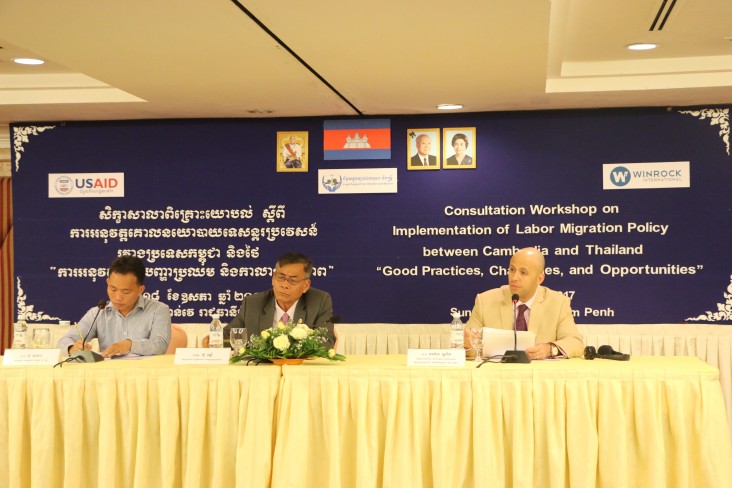
(as prepared for delivery)
- His Excellency Hou Vudthy, Undersecretary of State of Ministry of Labor and Vocational Training
- Mr. Vireak Pin, Executive Director of Association of Cambodian Recruitment Agencies
- Mr. Sokchar Mom, Director of Legal Support for Children and Women (LSCW)
- Distinguished guests, ladies and gentlemen.
Thank you all for coming today. I am very pleased to join you for this very important and timely consultation workshop. I would like to take this opportunity to thank Winrock International and LSCW for their work on this issue. I would also like to extend my gratitude to His Excellency Hou Vudthy from the Ministry of Labor and Vocational Training which has been playing a leading role in Cambodia’s fight against human trafficking. Thank you, Your Excellency, for your outstanding efforts especially in the areas of prevention of and protection from this pressing transnational crime.
Human trafficking is one of the most important human rights challenges of our time. It preys upon the vulnerable, breaks down the rule of law, and corrupts global commerce. It is a serious transitional crime which destroys the lives of millions of people worldwide each year including Cambodia.
The United States government cares deeply about trafficking in persons because it affects not just individuals and their families, but also communities and entire countries, regardless of their location or level of economic development. We know from experience that strong coordination among government, civil society, and the private sector is critical for ending human trafficking. The Royal Government of Cambodia shares our concern and the National Committee for Counter Trafficking has provided the leadership and coordination needed to make real progress against human trafficking.
The U.S. government - through USAID and other agencies - is among the largest donors combating this scourge. Between 2001 and 2010, USAID spent $163 million in 68 countries to fight the trafficking of human beings. We support all four strategic pillars of the counter-trafficking response: prevention, protection, prosecution, and partnership. In Cambodia, USAID has supported the fight against human trafficking for more than a decade. In October 2015, we awarded the four-year Cambodia Countering Trafficking in Persons project to Winrock International. This projects aims to address the root causes of trafficking; protect and assist victims who have been trafficked, strengthen local governance structures to address these crimes, and increase the likelihood of prosecution.
Fighting human trafficking is not only about prosecuting perpetrators, but also about preventing vulnerable people from becoming victims. Making sure that potential victims are equipped with skills and provided employment opportunities is the best way to prevent them risking unsafe migration which could lead them to a life of indentured servitude or, indeed, slavery. For example, we recently launched the innovative Bong Pheak platform in collaboration with the Open Institute. Bong Pheak is the first online job seeker service platform in Cambodia for low-skilled and unskilled workers such as those employed in construction, factories, hospitality, and security. Bong Pheak is helping workers find safe employment within Cambodia rather than seek employment abroad through illegal and unsafe means. Finding a Cambodian safe work at home means that we protected one more person from being trafficked.
Unemployment is one of the root causes of trafficking. Thousands of Cambodian migrant workers migrate domestically and internationally for jobs. Studies show that, in 2016 alone, there were approximately 50,000 migrant workers who arrived at the Migrant Assistance Center from destination countries such as Thailand and Malaysia. Thailand continues to be the top destination country for Cambodian migrant workers.
Today, we take another important step to address the issues of exploitation and human trafficking in the context of labor migration, especially in fishing and its related industries. I hope today’s consultation workshop will provide opportunities to stakeholders from both Cambodia and Thailand to share good practices, challenges, and opportunities related to the implementation of Cambodian and Thailand Labor Migration Policies.
In closing, I would like to recognize once again the important progress the Cambodian government and its partners have made to combat human trafficking of all kinds. We are committed to working closely with the government on this critical challenge in the months and years ahead. Our hope is that one day, when Cambodians seek to migrate to take up new jobs, they can do so safely and legally, and work and live in dignity and without fear of being trafficked.
Thank you very much.
Related Speeches
- Remarks by Polly Dunford, Mission Director, USAID Cambodia, Launch Event of Feed the Future Cambodia Harvest II
- Remarks by Christina Lau, Deputy Director, Office of Public Health and Education, USAID/Cambodia, Opening Ceremony of the Kick-Off Workshop for “One Health Workforce”
- Remarks by Veena Reddy, Deputy Mission Director, USAID Cambodia, EPIC Showcase







Comment
Make a general inquiry or suggest an improvement.